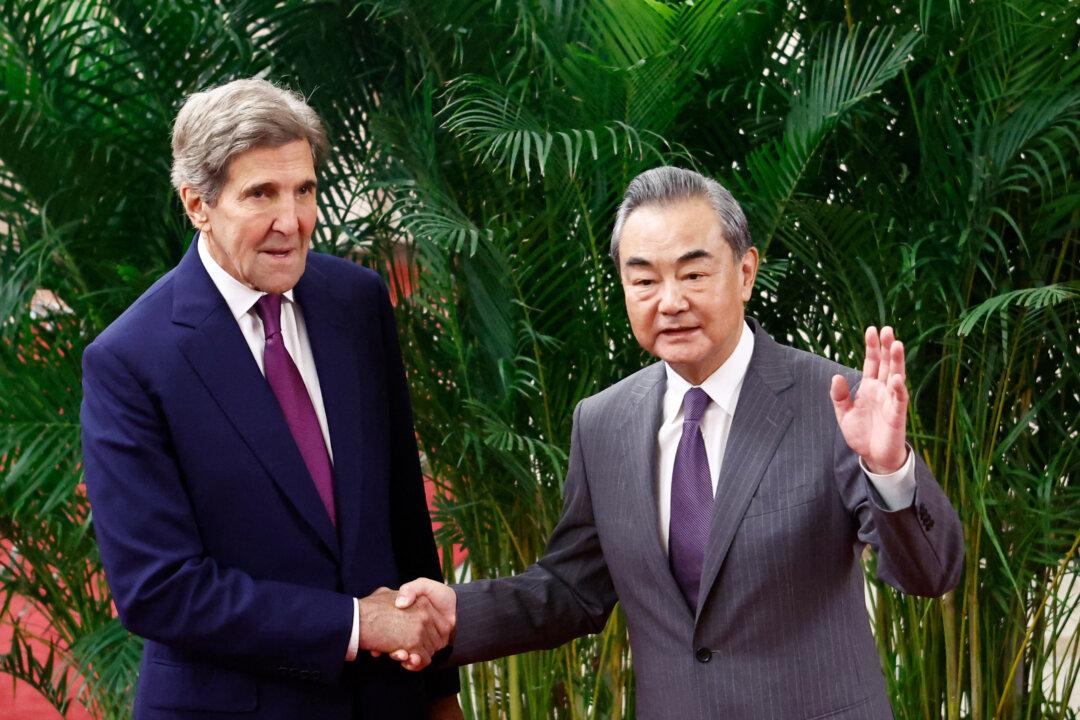The Biden administration’s desperation to get China on board with the climate change agenda is handing the Chinese communist regime a “tremendous opportunity” to bend the situation to its advantage, according to Kelly Sloan, a senior fellow in energy and environment at the Centennial Institute.
“There’s a lot on the plate that China wants and the United States seems willing to give up,” Mr. Sloan said in an July 28 interview on the EpochTV’s “Crossroads.”
“They want to see what they can get out of the United States in terms of trade negotiations, pulling back on some export controls—perhaps pulling back the controls on fentanyl precursor imports, arm sales to Taiwan, security assurances for Taiwan,” he told host Joshua Philipp. “China is willing to make some deals. They see this as a bargaining chip.”
The interview comes as John Kerry, President Joe Biden’s climate envoy, went to Beijing to resume the bilateral climate talks that were suspended for almost a year after former House Speaker Nancy Pelosi (D-Calif.) visited Taiwan. The meetings with the Chinese officials revealed “things we clearly agreed on,” according to the former secretary of state, but didn’t lead to any new agreement on climate change.
Despite the lack of breakthrough, those supporting the Biden administration’s climate agenda celebrated the reopening of climate diplomacy between the world’s two biggest carbon-dioxide emitters, and remained optimistic about the “ambitious and agreed outcomes,” as Mr. Kerry put it at the upcoming United Nations COP28 summit in Dubai.
Mr. Kerry’s four-day trip wasn’t received well by Republican members of Congress, including Rep. Michael McCaul (R-Texas), who chairs the House Foreign Affairs Committee.
“[Mr.] Kerry returning from his China trip with nothing from the CCP [Chinese Communist Party] beyond plans for future talks is just another example of how this administration has no China strategy,” Mr. McCaul said. “Diplomacy can be effective, but not from a position of weakness. The administration must have clear goals and asks when it comes to China.”
Mr. Sloan shares Mr. McCaul’s criticism, saying that not only wasn’t Mr. Kerry placing himself in a strong negotiating position, but that the goals of the negotiation weren’t very clear.
“The issue I saw with Mr. Kerry’s visit to Beijing was he seems to be coming from a position of desperation,” Mr. Sloan said. “I take him at his word that he’s a true believer in climate change. He views it as an existential threat. And that being so, he’s coming at this from a position of not a whole lot of strength.”
“I think the Chinese Communist Party is seeing this, and they are more than willing to take advantage of it.”
Unlike Mr. Kerry, the CCP leadership doesn’t appear to believe that human activities are changing the Earth’s climate or that China has any responsibility to curb those supposed changes, Mr. Sloan noted. But regardless of that, Beijing has been making it clear that it won’t let climate commitment get in the way of economy growth.
“They are not going to do anything that’s going to compromise their economic growth. They need to bootstrap themselves to the twenty-first century, and they’re going to need fossil fuels, electricity, and energy to be able to do that,” he explained.
In fact, shortly after Mr. Kerry returned home, Chinese leader Xi Jinping reiterated in a speech that China would resist outside pressure and make sure that “the path, manner, pace, and intensity” to achieve climate goals are “determined by the country itself rather than swayed by others,” according to CCP propaganda organ Xinhua News.
“They are not going to sacrifice their economy on the altar of climate change and greenhouse gas reductions,” Mr. Sloans said. “So it’s unclear to me what Mr. Kerry thinks he’s going to realistically get, and it’s concerning to me what Mr. Kerry might be willing to give up in exchange for what little he may be able to get.”
“To them, that gives them not just an economic economic advantage but geopolitical advantage as well,” he told Mr. Philipp. “They can put a lot of things on the plate. Perhaps it’s the U.S. Navy’s freedom of transit of the Taiwan Strait, or in the South Pacific in general. They see this as a tremendous opportunity to try and wring out whatever they can from, particularly the United States, but other countries in the West as well.”
The Biden administration’s attempt to accelerate the transition to so-called renewable energy has also been overshadowed by China’s human right abuses. In 2021, for example, it was revealed that China was using slave labor in the country’s northwestern region of Xinjiang to produce solar panels. When asked about the report at that year’s COP26 summit in Glasgow, Mr. Kerry replied that his job was “to be the climate guy” and the issue was “not [his] lane.”
“I think dealing with China and ignoring the human rights abuses in exchange for a few solar panels is morally somewhat repugnant,” Mr. Sloans said, adding that, going forward, the United States and its allies must be “very realistic” when trying to make deals with the CCP.
“It’s not just economic. It’s strategic. It’s geopolitical. And we can’t ignore the moral side as well,” he continued. “There’s a reason we are who we are. Not just in the United States but in the West in general. Our deals need to mean something.”






